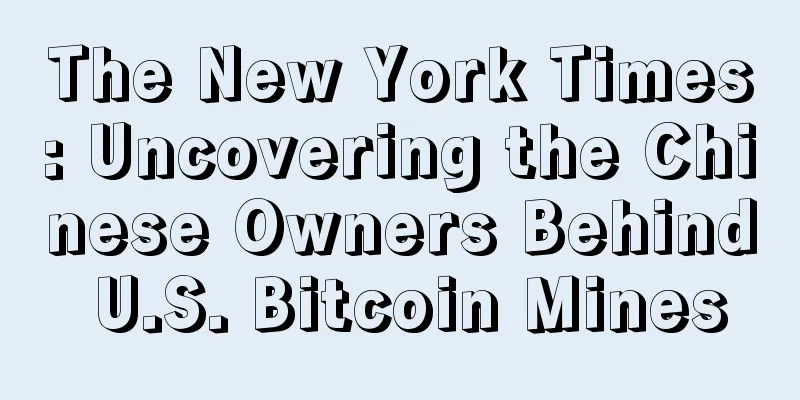The New York Times: Uncovering the Chinese Owners Behind U.S. Bitcoin Mines

|
A legal dispute in a small town in Texas, USA, accidentally exposed the mysterious owner behind the local mine: a Chinese college student. Jerry Yu, a 23-year-old New York University student, is a typical Chinese fuerdai, with a Connecticut prep school education and living in a Manhattan apartment that he bought from former General Electric CEO Jeffrey R. Immelt for $8 million. He is also the majority owner of a Bitcoin mine in Texas, which Jerry Yu acquired last year for more than $6 million, but not with U.S. dollars, but with cryptocurrency. Cryptocurrencies are anonymous and transactions are conducted through offshore exchanges, which prevents anyone from knowing the source of the funds. This allows Chinese investors to avoid the supervision of the U.S. banking system and federal regulators. In traditional transactions, the bank receiving the funds will know where the funds come from and report any suspicious activity to the U.S. Treasury Department as required by law. None of this would have been known if Jerry Yu’s company, BitRush Inc., also known as BytesRush, hadn’t run into trouble in a small Texas Panhandle town. BitRush owed contractors money for work, and a series of lawsuits surrounding the matter shed light on transactions that normally would not be made public. After the Chinese government banned Bitcoin mining in 2021, many Chinese investors flocked to the United States and spent hundreds of millions of dollars to build or operate cryptocurrency mines. These mines are a way for Chinese investors to produce cryptocurrencies (mainly Bitcoin) that they can cash out for U.S. dollars on exchanges. Jerry Yu's mine is built on an open field and consists of dozens of buildings that can accommodate 6,000 special mining machines. These computers run day and night to "guess" the correct sequence of numbers to obtain Bitcoin, which is currently worth more than $40,000 per Bitcoin. According to the New York Times, the mine may put a burden on the national power grid, and the Chinese identity of the mine owner has also attracted U.S. national security scrutiny. In the lawsuit against Chinese citizen and U.S. resident Jerry Yu, BitRush contractors claim that Yu is “not only a Chinese citizen, but also a citizen in a high position of power, political influence, and business status.” The lawsuit does not provide conclusive evidence of his identity, and the financial trail ultimately ends at the cryptocurrency exchange Binance. By using USDT to trade on Binance's offshore exchange, Jerry Yu's investors have no way of knowing the source of their funds. U.S. government officials said Binance's offshore business did not comply with U.S. banking rules when trading. Last month, Binance pleaded guilty to violating anti-money laundering regulations and agreed to pay more than $4.3 billion in fines. At the heart of Binance’s case was its failure to comply with laws including the Bank Secrecy Act, which obligates service providers to verify customers’ identities and flag suspicious money transfers. Gavin Clarkson, an attorney for BitRush, responded in an email that the company complies with all necessary federal, state and local laws and regulations, including the Bank Secrecy Act. The contractor's claims are all unfounded, including the delay in payment of project fees. "BitRush is owed money, not owed money." In its lawsuit against the contractor, BitRush accused the contractor of "gross negligence" in its work and demanded $750,000 in damages. Brent Loudder, who was in charge of the electrical and plumbing work on site, said the contractor was being owed money for the work. The town where the mine is located has a population of only 281 people BitRush’s arrival in town attracted a lot of attention, and some residents found jobs building the mine. Brent Loudder, who oversaw the electrical and plumbing work, said the contractors were not paid until they stopped work in protest. Another electrical contractor also filed a lawsuit against BitRush over wages. Documents shared by the contractor’s lawyer David Huang reveal how BitRush plans to acquire the mining farm: the seller Outlaw Mining will receive $6.33 million in USDT, and the purchase agreement lists a wallet address to which the funds will flow. Transaction records show that the wallet address belongs to the cryptocurrency brokerage company FalconX, and $5.077 million should be paid at the end of the transaction, which was completed last year. Prior to this, $500,000 in USDT was paid as a deposit, and another $750,000 was paid in USDT after BitRush obtained the on-site equipment, supplies and materials. However, the source of the funds was not recorded, and the agreement did not specify who would make the payment, a piece of information known only to Binance, which processed the transaction. Gavin Clarkson, a lawyer for BitRush, said BitRush had never sent or received any funds through Binance. Purvi Maniar, FalconX deputy general counsel, said in a statement that the company was “unaware of the source of the funds.” Chainalysis spokesperson Madeleine Kennedy said that once funds are sent to a centralized service on the blockchain, the individual who sent the funds to that exchange can no longer be traced without legal process such as a court order. Binance spokesperson Jessica Jung said that Binance has deployed strict procedures to verify the identity of customers. The crypto wallets of three Binance accounts made USDT payments, but these funds belonged to foreigners who were not US residents. "Binance does not and does not provide services to any US customers." Payment using USDT is common in the Bitcoin mining industry. A miner in Arkansas and another in Wyoming both said they used USDT to buy specialized computers made by Chinese companies, and one of the benefits of those transactions was that they could avoid sales and capital gains taxes. A document shared by the contractor’s lawyer, David Huang, confirmed the identities of some of BitRush’s shareholders. After Jerry Yu, the largest investor is an investor from IMO Ventures, a China-focused venture capital firm in San Mateo, California. In addition, there is another shareholder called “Lao Yu.” WireScreen company records show that Yu Hao and Sun Xiaoying signed the mortgage documents for Jerry Yu's Manhattan apartment, matching the names of a Chinese married couple who own more than $100 million worth of company shares. In addition, Sun Xiaoying is also listed as a director of BitRush. Clarkson, Jerry Yu’s attorney, declined to confirm the identities of BitRush’s shareholders or their relationship to Jerry Yu. Outlaw Mining founder Josey Parks said by phone that he could not comment on financial arrangements related to BitRush because he was bound by a nondisclosure agreement. Parks later said in a text message: "From what I know, Jerry Yu is a college student in the US and his family is very wealthy. I don't know any of his investors or any relationship he has with foreign entities." |
<<: Bitcoin reserves in China and the US exposed
>>: How to judge the beginning and end of the bull market in the bull market investment guide?
Recommend
Honor releases Magic 3 series flagship phone, the first Snapdragon platform product to support digital RMB
Honor releases Magic 3 series flagship phone, wit...
What are the mainstream Bitcoin inscriptions? How to seize the next 100x MEME token
Recently, Bitcoin inscription tokens have become ...
What kind of people are prone to early marriage?
Whether a person will get married early or late c...
What facial features reveal that you will be framed by your friends
What facial features reveal that you will be fram...
A detailed analysis of the three major facial features of cheating women: Women are prone to cheating!
Cheating is irresponsible behavior, regardless of...
What is the horse eye?
Horse eyes: People with horse eyes have big eyes,...
Bitcoin’s comeback is mixed
There will be a sharp rise and a sharp fall. A sh...
Romanian University Plans to Accept Cryptocurrency as Payment for Admission Fees
A public university in the Romanian city of Sibiu...
Look at the marriage line in palmistry. These types of people will not settle down after marriage.
The reason why we choose to enter into marriage an...
How to look for a woman with high apple muscles and how to exercise her apple muscles
The apple muscle is the fleshy muscle two centime...
What does a person with good fortune look like?
Everyone has a unique face of his or her own. In ...
What does a mole on a man’s ear mean for his career luck?
One of the factors that influence destiny is the ...
What kind of facial features does a woman with a prosperous husband have?
Men should get married when they are old enough, ...
When will the next Bitcoin bull run come?
The price of Bitcoin broke out in 2021, surpassin...
Are you a lucky woman who is held in the palm of a man's hand?
Are you a lucky woman who is held in the palm of ...









